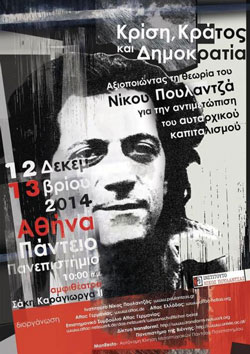Nicos Poulantzas has been one of the most important scholars in the field of theory development in the areas of the state and its development. His contribution linked in a creative way different strands from the Marxist discourse. Being a passionate activist, his contribution is especially meaningful as he aimed on making theoretical reflections relevant for the further development for emancipatory politics. Nevertheless, his work has been underexposed in the context of debates on European (dis-)integration. In the light of the crisis and the process of increasingly authoritarian politics it is even more important to utilise this pool of knowledge, in order to better understand the contradictory character of the process and to elaborate alternatives that opens perspectives towards a radical socialist transformation to a democratic society.
Logistics and other relevant information
Languages: English, Greek
Conference languages are English and Greek – translation will be provided. The debates will be videotaped. It is also planned to utilise the work in different ways for publications and documentations.
There are no conference fees to be paid. However, donations are welcome.
Organisers
Nicos Poulantzas Institute Athens
Attac Germany
Attac Hellas
Scientific Council of Attac Germany
transform! europe
University of Vienna, Area of International Politics
Manifesto Group of Post grad and Phd Students, Panteion University
Programme
The following provides the list of main topics, some key questions and the speakers.
Friday, 12 December
9.00 – 10.00 (EET): Welcome
10.00 – 12.00 (EET): SESSION 1
Making Nicos Poulantzas theory fruitful for a critical reflection on the current development of European integration and the euro-crisis management
- European integration post-WWII: essence; a moment in history?
- Euro-crisis – Main components
- The handling of the crisis by the European elites: the narrative of austerity
Input: Konstantinos Tsoukalas (University of Athens), Frieder Otto Wolf (Freie Universität Berlin)
Facilitator: Kenneth Haar (CEO, Brussels)
12.00 – 14.00 (EET): SESSION 2
Class structures and class subjectivities
- The changing class structure of Europe
- Formation of old and new class subjectivities under the crisis
- The dynamic of class alliances and the forms of tension between classes, their fractions, political actors and the social movements of civil society
Input: Georgios Daremas (Nicos Poulantzas Institute; Attac Hellas), Martin Konecny (CEO, Brussels)
Facilitator: Hanna Lichtenberger (University of Vienna)
14.00 – 15.00: Lunch Break
15.00 – 17.00: SESSION 3
The transformation of the “power bloc”
- The (frictional) configuration of power relations on the national level and on the EU level since the 1980s – The concept of class operationalised.
- Which role has financial capital played?
- What has been the role/position of labour?
Input: John Kannankulam (University of Marburg), Giorgos Chondros (member of the movement against the Aheloos River)
Facilitator: Alexandra Strickner (Attac Austria)
17.00 – 17.30: Break
17.30 – 19.30: SESSION 4
Nicos Poulantzas’ concept of “authoritarian statism”
- Authoritarian statism as a reaction to the European crisis – a new phase of neoliberal transformation?
- European (dis-)integration – between national interests and the emergence of a new supra-national entity: The political debate
- The role of the Left
Input: Lukas Oberndorfer (Chamber of Labour, Vienna), Haris Golemis (Nicos Poulantzas Institute)
Facilitator: Akis Leledakis (Panteion University; Attac Hellas)
Saturday, 13 December
10.00 – 12.00 (EET): SESSION 5
Country-related perspectives and consequences of the transformation of power structures in the EU
- Is Germany the new ‘hegemon’ in Europe? Current hegemonic structures in the EU
- What are the implications for Southern Europe and the CEEs (e.g. nationalism and separatist movements)
- The Greek experience
- Which path is conducted in the EU with respect to global relations? The new trade and investment agreement between the EU and the USA
Input: Makis Kouzelis (University of Athens; Nicos Poulantzas Institute), Alexis Passadakis (Seattle of Brussels Network, Cologne)
Facilitator: Peter Herrmann (Scientific Council attac Germany; EURISPES – Osservatorio Europeo sulla Qualità Sociale)
12.00 – 14.00: SESSION 6
Global Analysis
- How was transnationalising capital inscribed into dependent economies through the process of “interiorisation”?
- What did this mean for different class factions?
- Which role do financial capital and financialisation play?
- How are different groups of the subaltern classes integrated into and excluded from the power bloc?
Input: Morten Ougaard (Copenhagen Business School), Vasso Kanellopoulou (Attac Hellas; Seeds movement), Ilker Ataç (University of Vienna)
Facilitator: Etienne Schneider (University of Vienna)
14.00 – 15.00: Lunch Break
15.00 – 17.00: SESSION 7
Nicos Poulantzas’ perspective of a “democratic socialism”
- Challenges for the European Left and the social movements
- Confronting authoritarian capitalism: Change through institutional pressure from within and without
- The democratic way to socialism
Input: Galip Yalman (Middle Eastern Technical University), Eleni Portaliou (Technical University of Athens; Athens Borough Councillor)
Facilitator: Armin Puller (University of Vienna)
17.00 – 17.30: Break
17.30 – 19.30: SESSION 8
CLOSING SESSION: Crisis, state and democracy – Working with Nicos Poulatzas’ theory to confront authoritarian capitalism
- Summing up the sessions
- How to continue working with Nicos Poulantzas’ concepts and ideas
- Toolkit in social theory and activist strategy
Input: Aristidis Baltas (Technical University of Athens; Nicos Poulantzas Institute), Ulrich Brand (University of Vienna; Scientific Council of Attac Germany)
Facilitator: Marica Frangakis (Nicos Poulantzas Institute; Attac Hellas)
